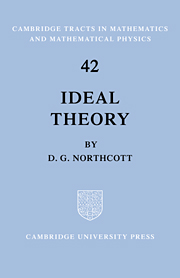Book contents
- Frontmatter
- Contents
- Author's Preface
- Preliminaries
- Chapter I THE PRIMARY DECOMPOSITION
- Chapter II RESIDUE RINGS AND RINGS OF QUOTIENTS
- Chapter III SOME FUNDAMENTAL PROPERTIES OF NOETHERIAN RINGS
- Chapter IV THE ALGEBRAIC THEORY OF LOCAL RINGS
- Chapter V THE ANALYTIC THEORY OF LOCAL RINGS
- Notes
- References
- Index of Definitions
- Frontmatter
- Contents
- Author's Preface
- Preliminaries
- Chapter I THE PRIMARY DECOMPOSITION
- Chapter II RESIDUE RINGS AND RINGS OF QUOTIENTS
- Chapter III SOME FUNDAMENTAL PROPERTIES OF NOETHERIAN RINGS
- Chapter IV THE ALGEBRAIC THEORY OF LOCAL RINGS
- Chapter V THE ANALYTIC THEORY OF LOCAL RINGS
- Notes
- References
- Index of Definitions
Summary
The theory of ideals, in its modern form, is a contemporary development of mathematical knowledge to which mathematicians of to-day may justly point with pride. It not only has the generality and purity of logical structure, which is typical of so much of the work that has been done in recent years, but also it has contributed, in a substantial way, to the growth of an older branch of the mathematical tree, namely, algebraic geometry. It is not possible, in a volume of this size, both to give a useful account of the purely algebraic parts of our subject and also to give examples of the deeper applications, but it has proved possible to weave into a connected algebraic theory those results which play outstandingly important roles in the geometric applications. This is precisely what has been done. It is the author's hope that this tract will extend the interest taken in a new mathematical territory, by enabling the reader to travel, in relative comfort, along the road which pioneers like E. Noether, W. Krull, C. Chevalley and I. S. Cohen have constructed. Before he sets out, however, either to see the sights or with the intention of joining in the work when he reaches his destination, the traveller may fairly ask whether or not his present equipment will be sufficient for the proposed journey. Provided he has reached the standard of a good honours degree in mathematics he has no cause to worry.
- Type
- Chapter
- Information
- Ideal Theory , pp. vii - viiiPublisher: Cambridge University PressPrint publication year: 1953

